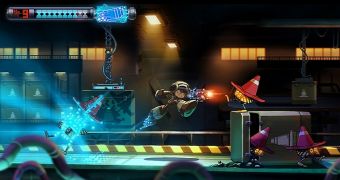This year's edition of the Game Developers Conference, held in San Francisco this week, was an endless source of reveals and interesting talks, such as why a League of Legends writer thinks plot is overrated in video games, a claim backed with statistical data, and everyone knows you can't go wrong with maths.
One such discussion involved Keiji Inafune, the legendary Japanese game designer responsible (among others) for the Mega Man franchise, who is currently working on making a spiritual successor of the platformer, titled Mighty No. 9.
The initiative was sparked by his belief that game designers stopped innovating as far as two-dimensional platformers go when 3D graphics became more and more accessible, and Mighty No. 9 is his attempt to evolve the genre.
He's been very successful in his crowdfunding campaign, and the GDC saw yet another video of him casually blitzing through an alpha build of Mighty No. 9, with accompanying descriptions of the protagonist's brothers and sisters.
He is famous for having said that Japan's reign in the video gaming world has long since ended, an opinion which apparently he still holds today.
Japanese games aren't doing very well in the U.S. and overall in general, as Siliconera points out. The fact that Japanese devs need to come out with new content that is appropriate for today's market is a point of view that many players and developers share, including Takamasa Shiba, producer of the famous Drakengard series.
In an interview about Drakengard 3, he attributed the series' success to its mature storyline, as at the time of its inception, the team wanted to take a different direction from the stereotypical Japanese role-playing game design paradigm, with childish characters and simplistic themes, wanting their game to cater to a more mature audience, one that is interested in tackling more complex issues and encountering more profound characters.
During a panel talk at GDC, Inafune shared his thoughts on being an independent developer, saying that watching indie developers in the west helped him figure out what to do after leaving Capcom. Japanese games haven't gotten their energy levels high enough yet, and they face an uphill battle if they want to get back to where they once were.
He suggested that, in a sense, the original Mega Man was a sort of indie movement inside Capcom, as at the time the company was focused on arcades, and his team was tasked with porting arcade games to home consoles such as the Famicom.
The development team for Mega Man 1 consisted of just six people, three of which being new hires with no experience or notion of what they were going to work on at the time, and that the team's passion and ambition that ultimately led to Mega Man's creation is where the "heart of indie" lies.

 14 DAY TRIAL //
14 DAY TRIAL //